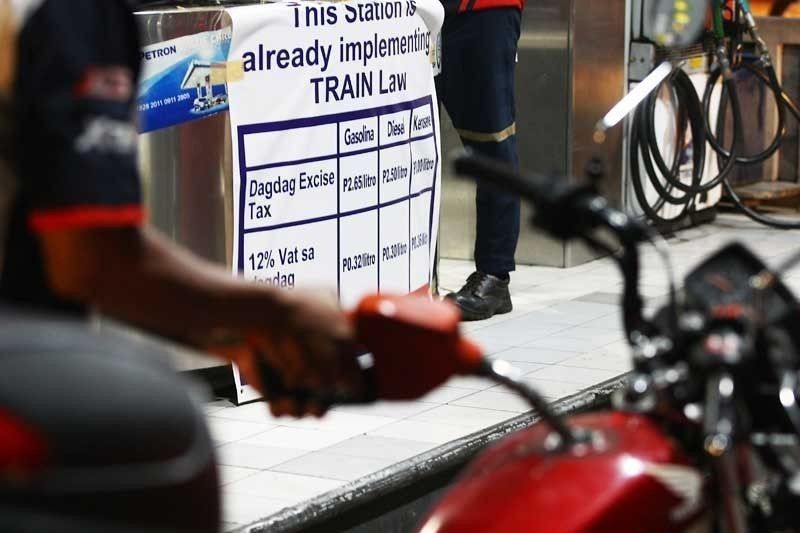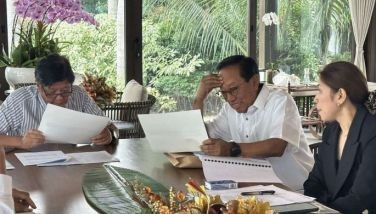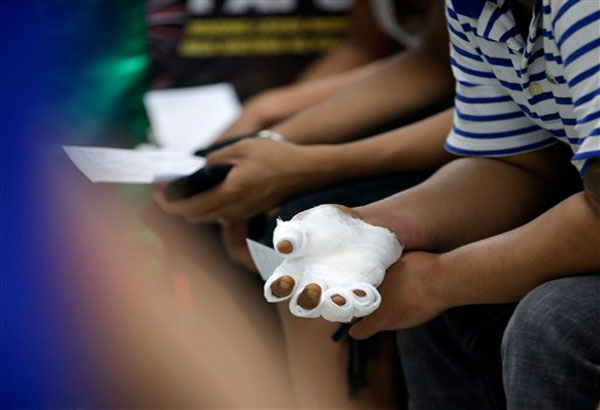Senate: Speedy budget OK if fuel tax hike suspended

MANILA, Philippines — Senators could dangle the speedy passage of the proposed P3.757-trillion national budget for 2019 in exchange for suspending the increase in excise taxes on gasoline and diesel next year.
Meanwhile, the country’s growth will likely further slow down as the government continues to struggle in containing inflation if the Duterte administration insists on implementing the increase, a senator said yesterday.
Sen. Sherwin Gatchalian, chairman of the Senate committee on economic affairs, issued the statement as members of the Development Budget Coordinating Council (DBCC) are set to present to President Duterte tomorrow a recommendation to implement the second hike next year, as provided by the Tax Reform on Acceleration and Inclusion (TRAIN) law.
“We saw that our economy slowed down because our consumption is a major driver of our economy. We’re a consumption-based economy—when prices go up, people don’t buy and our growth slows as we saw in the past quarters,” Gatchalian told radio station dzBB.
Gatchalian said the trend on the country’s Gross Domestic Product (GDP) showed that the administration will not be able to achieve the high-end of its 2018 growth target of eight percent.
The senator is seeking a clear and detailed explanation from the DBCC—composed of heads of the Departments of Finance, Budget and Management, National Economic and Development Authority, Bangko Sentral ng Pilipinas and the Office of the President for oversight – on why the body was reversing its recommendation made in October given its members’ expertise, access to data and economic and monetary tools at their disposal.
Under the TRAIN law, an increase of P2.50 per liter of gasoline and diesel in excise taxes was imposed at the start of the year. The next round of P2 per liter will be added in 2019 or a total of P4.50 in hikes since the law took effect in January this year.
Under the law, the increase can be suspended if the three-month average price of Dubai crude reaches at least $80 per barrel.
The third quarter GDP slowed down to 6.1 percent as rising inflation dampened consumer spending, a major growth driver. The figure was slightly higher than 6.0 percent the previous quarter.
Socioeconomic Planning Secretary Ernesto Pernia earlier said had it not been for inflationary pressures, the country could have realized a GDP growth of between 6.5 percent to 7 percent during the quarter.
Pernia, however, stressed that the Philippines remained one of the fastest growing economies in Asia.
Gatchalian recalled that during a special hearing on the impact of inflation conducted by his committee on Oct. 24, economic managers repeatedly committed to suspend the scheduled fuel excise tax increase even if oil prices go down.
He said he was surprised by the DBCC turnaround as lawmakers and economic managers had “full information” on the expected decline in global oil prices and warned that the credibility of Malacañang was at stake.
Gatchalian said despite the decline in local pump prices, the cost of basic commodities has not gone down.
He warned that inflation would be “pushed further” if the government—already struggling to contain rising prices—will implement the next round of fuel excise tax increases.
Inflation refers only to the rate of increase of prices but not the actual spike, which he said, means any spike in prices will be coming from the current high base.
Gatchalian said many wage earners and small businesses resorted to taking out loans to allow them to cope with rising costs and allow their trade to continue.
Suspending the next round of increases will allow the people to have breathing space to recover a bit, he said.
Sen. Panfilo Lacson however favored the latest proposal of the DBCC.
“I agree with DBCC. The conditions for the suspension of the excise tax hike no longer exist. World oil prices are down; hence the weekly fuel rollback. Shortage in revenue collection results in more borrowings, which translates to bigger budget deficit, then new or higher taxes,” Lacson said in his Twitter account.
Cabinet discussion
The economic team’s decision to withdraw the proposal to suspend next year’s oil excise tax hike will be discussed during a Cabinet meeting tomorrow, Malacañang said yesterday.
Presidential spokesman Salvador Panelo said President Duterte is studying the economic team’s decision, which came as global oil prices dropped on oversupply concerns.
“It is still being studied. Tomorrow, we will have a Cabinet meeting... that will be taken up in the Cabinet,” Panelo said in a radio interview.
Panelo added that it was logical for the economic team to withdraw its proposal given the “dramatic decrease” in oil prices.
“(Economic managers) were anticipating that oil prices would go up but the prices went down. They called for a suspension (of the next round of oil excise tax increase) because they thought prices would breach $80 per barrel. But since the prices are falling, logically, you have to backtrack on the recommendation,” he said.
The TRAIN law slapped new taxes on diesel, liquefied petroleum gas, kerosene and bunker fuel for electricity generation and higher taxes on other oil products. The upward adjustments will be implemented gradually from this year to 2020.
Under the law, the next round of oil excise tax hike may be suspended if the average price of Dubai crude based on Mean of Platts Singapore reaches or exceeds $80 per barrel for three consecutive months.
While the condition was not realized, the economic team agreed in October to seek the suspension of the tax hike to manage inflation expectations and prevent hoarding and profiteering.
The economic managers backtracked on their proposal last week, citing a “favorable outlook in world oil prices,” where the Dubai crude oil prices have gone down by 14 percent from an average of $79 per barrel in October to $68 per barrel last month.
Oil prices are expected to drop further to below $60 per barrel, prompting the economic team to recommend the continued implementation of the second tranche of excise taxes on petroleum products under TRAIN.
The suspension of the oil excise tax hike could have resulted in about P40 billion in forgone revenues next year, officials said.
Leni’s opposition
Vice President Leni Robredo opposed yesterday the recommendation of Duterte’s economic managers to push through with the next round of oil tax increase next year due to the recent drop in world crude prices.
Robredo’s spokesperson Barry Gutierrez said the decline in global oil prices would not automatically result in the lowering of prices of other consumer goods.
“Even if the prices in world market drop, the local prices would not immediately follow,” Gutierrez said in an interview with dzXL.
“So we are really saddened by this decision, because the people have been asking this government to suspend (the next round of increase of oil tax) as they are still reeling from high prices,” he said.
Gutierrez also noted that prices of noche buena (Christmas eve) items are expected to rise this month.
Robredo had been urging the government to suspend excise tax on fuel as the country’s inflation rate hit a record-high 6.7 percent in September and October.
The Vice President had said the high inflation is fueled in part by the excise taxes on petroleum products under the TRAIN law. – With Alexis Romero, Helen Flores ?
- Latest
- Trending






























